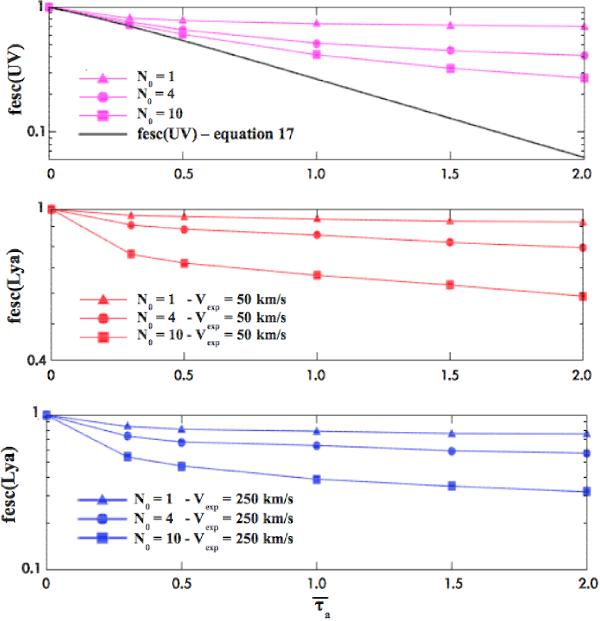Fig. 22

Predicted UV and Lyα escape fraction as a function of
 for the clumpy media studied in Fig. 21
(N0 = 1 (triangle), N0 = 4
(circle) and N0 = 10 (square)). Top:
fesc(UV) obtained from our simulations compared to Eq.
(17) used by HO06 to carry out their figure shown in the left panel of Fig. 21. Middle: Lyα
escape fraction fesc(Lyα) predicted by
our models for vexp = 50 km s-1. Bottom: same
as middle panel for vexp = 250 km s-1. As in
Hansen & Oh (2006), the
Lyα escape fraction is derived here at the line centre (i.e. the
intrinsic Lyα line is a delta function in our simulations) While a
clear decrease in the fesc(Lyα) with
increasing
for the clumpy media studied in Fig. 21
(N0 = 1 (triangle), N0 = 4
(circle) and N0 = 10 (square)). Top:
fesc(UV) obtained from our simulations compared to Eq.
(17) used by HO06 to carry out their figure shown in the left panel of Fig. 21. Middle: Lyα
escape fraction fesc(Lyα) predicted by
our models for vexp = 50 km s-1. Bottom: same
as middle panel for vexp = 250 km s-1. As in
Hansen & Oh (2006), the
Lyα escape fraction is derived here at the line centre (i.e. the
intrinsic Lyα line is a delta function in our simulations) While a
clear decrease in the fesc(Lyα) with
increasing  is found, HO06 instead assumes a constant value of
fesc(Lyα), indicated in the figure,
independently of the dust optical depth
is found, HO06 instead assumes a constant value of
fesc(Lyα), indicated in the figure,
independently of the dust optical depth  .
More precisely, HO06 assumes fesc(Lyα)
= (0.94; 0.68; 0.38) for vexp = 50 km s-1 and
fesc(Lyα) = (0.81; 0.43; 0.18) for
vexp = 250 km s-1.
.
More precisely, HO06 assumes fesc(Lyα)
= (0.94; 0.68; 0.38) for vexp = 50 km s-1 and
fesc(Lyα) = (0.81; 0.43; 0.18) for
vexp = 250 km s-1.
Current usage metrics show cumulative count of Article Views (full-text article views including HTML views, PDF and ePub downloads, according to the available data) and Abstracts Views on Vision4Press platform.
Data correspond to usage on the plateform after 2015. The current usage metrics is available 48-96 hours after online publication and is updated daily on week days.
Initial download of the metrics may take a while.




